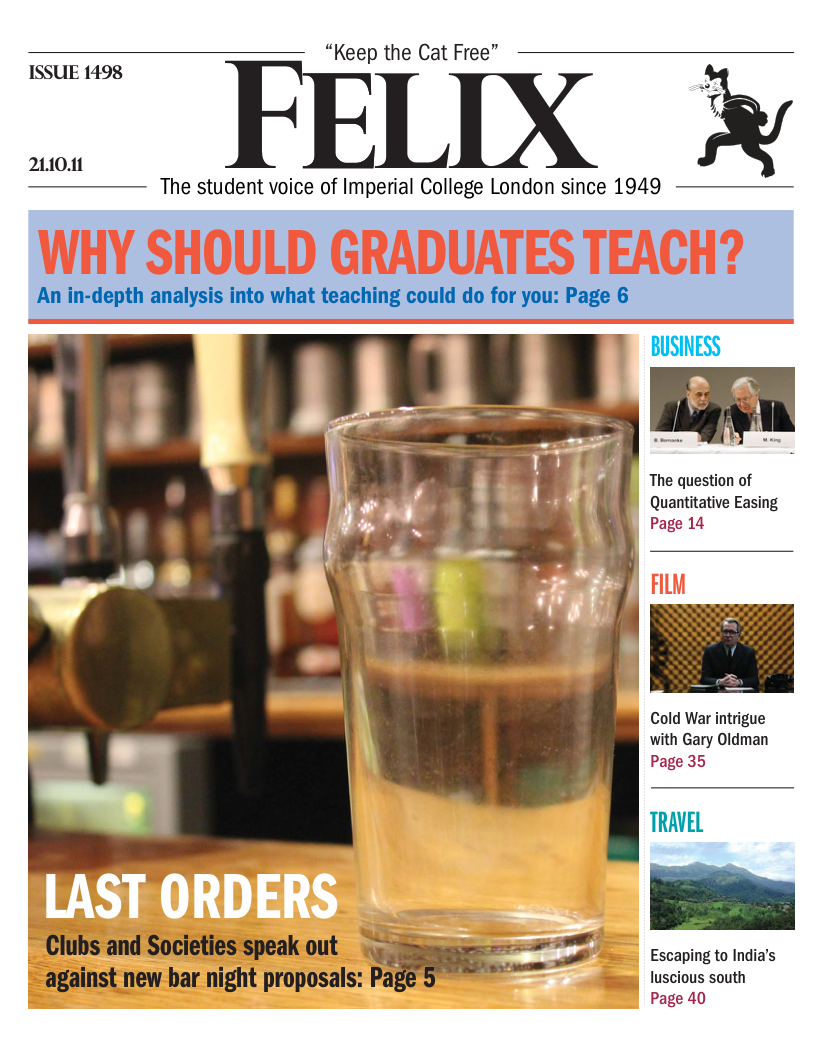Could the American university system work here?
Two Alexs go head-to-head over new degree proposals
Yes - Alexander Karapetian
We shouldn’t be so quick to react negatively towards the recent intention to change towards the American style system of having a Grade Point Average (GPA) by UCL. Students under the UK classification system are often under great pressures to attain a degree with 2:1 or above, with those not doing so risking slipping completely under the radar of potential employers.
The American system awards degrees with grades worked out from the average of the results of all courses taken. The grades are numerically representative of performance, more so than simply ‘’2:1’’, where one could be within the range of 60% to 69%, a large difference in academic performance. The system also allows for ranking within a cohort, offering honours such as Salutatorian and Valedictorian for the second highest and highest respectively. I disagree with such rankings, however, since this would discourage student cooperation and would increase competition, adding another pressure to the myriad already present in typical university life.
Aspects such as a numerical GPA can be used to the student’s advantage when looking for a job. Under the American system, since students associate their degree modules with majors and minors, one could recalculate their GPA using only classes within the major (e.g. for very specific job applications relevant to the major or to look more attractive by eliminating minors which may bring the average down). Applying this kind of system in the UK would provide pros and cons in a threefold manner.
Firstly, it would allow for employers to get a better feel for how well a student performed over their degree course on average. They would be able to distinguish between a borderline and comfortable first, useful in pruning the 70 from the 90 per cents. The disadvantage to this is that an average student who endeavoured tirelessly to bag a first with 70% or so will not be able to consider themselves safely in the same league as those in the 90s. Perhaps this is the right way forward though.
The American style system has its merits and could be the key to a progressive, internationally unified university system
The second element to consider if this system were widely implemented in the UK is that employers would then be compelled to consider a GPA as criteria for selection, rather than simply the top two degree classifications. By setting the bar reasonably, one would hope this could prevent the unlucky students who narrowly miss a 2:1 from feeling like their degree was a waste of time. Also, those who would normally obtain third class honours could still be taken into consideration, since reshuffling modules in the calculation could allow the blow of a low GPA score to be somewhat softened.
Lastly, one factor pushing UCL to consider the switch to GPA style scoring is grade inflation. Does a first from 2010 carry the same weight as one from 1994? Are students getting better/exams getting easier? That’s another discussion in itself, but it should be noted that with a GPA system using class ranking, grade inflation is eliminated. It is particularly evident that an increasing amount of British students are leaving for American universities. In the US, students can keep their options open by way of choosing minor courses alongside their majors. Although this can be said to exist in the UK, the choices are severely limited in comparison. A student would not have to choose their major until the end of the second year in the US.
One could argue that costs remain a significant factor deterring students from the American universities. However, it remains a little known fact that many British students will qualify for help as the British are relatively less well off than the Americans. A student with family income of £32,000 ($60,000) or below will have zero to pay towards fees, accommodation and even an annual flight back home. Students with a family income at the UK threshold for aid from grants (£37,425) will still only have to pay a few hundred pounds, and those with incomes up to £64,000 still receive aid from US universities. While the US certainly has more elite universities in the world’s top 20, the UK’s strong position for such a smaller country and population in world rankings must not be overlooked. The US degrees last longer, and UK students can be said to study a more focused curriculum with the added intensity of a shorter space of time.
Although my personal opinion remains against implementing the GPA system in the UK since I appreciate the prestige associated with first class degrees and feel many benefit from the masked percentages and employment securities attached to the current system, I do believe the American style system has its merits and could be the key to a progressive, internationally unified university system.
No - Alexandra Nowbar
I’m here to advocate the British university system. It should be a walk in the park – Hyde, not Central. And yes, that was about as hilarious as Gurl With Opinion’s article from last week was profound. She (or the troll) informs us that boys are magnetized by their confidence. I imagine boys reading her pearls of wisdom will be sceptical about this presumption and perhaps wonder why a girl so confident would not reveal her identity. But that aside (wouldn’t want to make too much of a fuss in case it was a troll), I expect my side of the argument to be easy to the point of thinking I could get away with any old ramble. However, there’s been too much daft writing of late so I will make an effort to present a strong case that focuses on undergraduate study.
The first hurdle to consider is the obvious financial burden of studying in the US: a minimum of 4 years’ study for an undergraduate degree at around £30,000 per year. That’s a lot to fork out without the help of a loan. That’s not to say a student wouldn’t get a government loan, it’s just that the US Department of Education want the money back at a rate of 3.4%. Yes, that’s a preferential rate when compared to ordinary loans but back in Blighty the rate, which used to be 0%, is currently a meagre 1.5%. These British handouts may not be sustainable, especially with our current level of graduate unemployment, but in the current economic climate I might venture that student loans are water under the bridge. For the sake of the issue in hand (and my mental health) we won’t worry about any of that.
The well-defined pathways in the British higher education system help students maintain focus
In my naivety, I’d expect the next hurdle for a high school graduate to be what subject to do but not on your nanny. We may not be fond of our obligation to choose a subject of undergraduate study in sixth form, but far better to decide then than to float around university aimlessly taking random classes. In the US a student commonly would not have to declare their “major” until the end of their third “semester” and even then a large proportion of students change their minds! At Harvard University, for example, a third of undergraduates change their fields after this declaration. Think how much time these students must be wasting. The well-defined pathways in the British higher education system help students maintain focus. And undergraduate students are known to be susceptible to indecision and easy distraction; more choice is not necessarily a good thing. At Imperial, people can, and do, change courses, but only very occasionally. Perhaps this is because we aren’t being bombarded with temptation from a wide range of classes.
I hope no one gives me nonsense about the Americans thus becoming more cultured and well-rounded because ultimately a student can’t really be a jack of all trades; whether it’s before or after university, we will all have to settle down and pick a career path. In theory there is nothing wrong with doing a minor but I feel that our system of having some optional modules within a course is more logical; there, a science student could take an English minor or an art class and because these would still be worth credits (i.e. doing well matters) they would take equal priority to studying for the major. I believe other interests really ought to be pursued externally.
Speaking of other interests, I imagine the sportier British student might envy Americans because of their college level sports. Americans have definitely tilted the balance in favour of promoting sport but I suspect they have gone too far. It is sometimes said that achievements on the field can outweigh academic achievements on admission to some American universities. There is a great deal of pressure on universities in the US for their sport teams to do well, so one can understand why they recruit in this way. But that’s not all. The real scandal is the escalation of sponsorship of in college football (American football) and the reported corruption. So let’s not be too jealous, I’m convinced that us ‘Brits’ don’t adopt the same obsession with winning and thus cheat or break the rules.
UCL deciding to offer GPAs as an alternative to the degree classification disappointed me, initially because I’m a patriot so I’d rather fix any purported issues within the current system than adopt the American way, but also in part because the continual monitoring reeks of primary and secondary education. So-called grade inflation can be countered by simply relaying one’s actual marks and this is not unheard of in the job market.
If Gurl With Opinions is speaking her ridiculous mind, I figured I’d better speak my slightly more sensible one, lest people lose faith in womankind altogether. Sadly, I’m not sure much can be done to redeem her.









